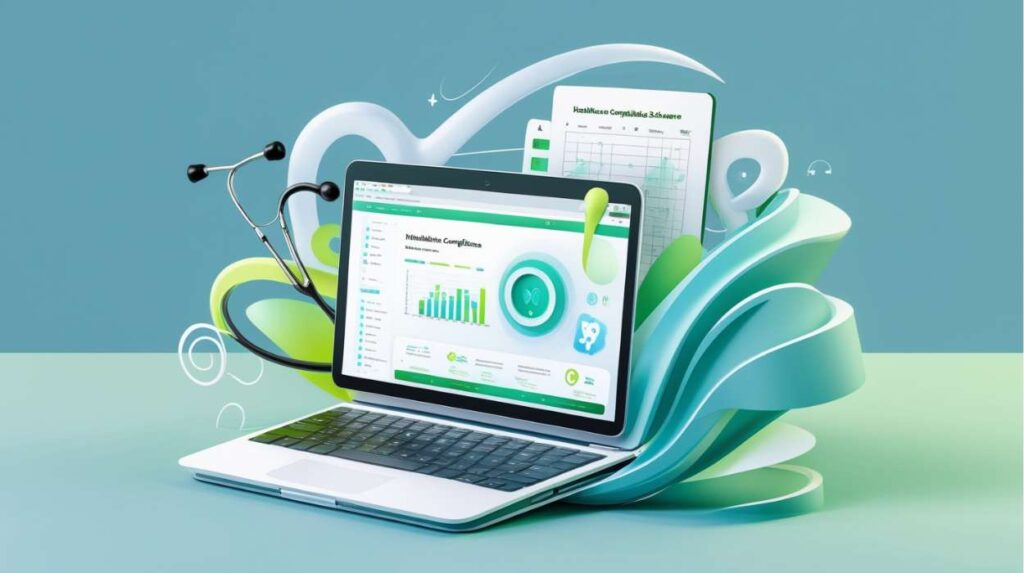It is mandatory of today’s healthcare organization to abide by the laws, regulatory standards and practices that govern the sector. Healthcare compliance applications are useful in installing and maintaining organization compliance with the Health Insurance Portability and Accountability Act, Health Information Technology for Economic and Clinical Health, and Occupational Safety and Health Administration standards as well as patient safety and privacy. Such Compliance software for hospitals help make work less time-consuming, audit less problematic, and compliance more manageable.
Healthcare software has become a must-have for today’s healthcare organizations. It helps them meet legal, ethical, and operational standards without breaking a sweat. This software makes the whole compliance process smoother, cutting down on the risks that come with doing things by hand. It makes sure organizations stick to HIPAA, GDPR, and OSHA rules. The software saves time by doing a lot of the work – things like managing policies, reporting incidents, checking for risks, and training staff.
On top of that, it boosts data security and helps operations run more. Apart from that, Medical compliance management tools prevents organizations from facing penalties, improves operational efficiency, and raises patients and other stakeholders’ confidence in the institution. In this article the focus will be turned to the selection of the ten top healthcare compliance software solutions.
What is Healthcare Compliance Software?
Healthcare mangement software assists healthcare organizations in meeting the legal requirements and other legal cares. These solutions help institutions on tracking and implementing policy, training, audit and reporting of incidents with risk assessment, which address regulatory requirements such as the HIPAA, GDPR or OSHA. This software replaces traditional manual methods; elements of the program include document management, record-keeping for employees, and audit compliance.
It helps organizations to perform well free from human interference, keeps records and defends the idea that organizations are ready in case of inspection and auditing. These tools also maximize the safety of patient information, increase organization’s accountability, and minimize legal fines. No matter whether concerns are about privacy and data security or about keeping accreditation standards, medical compliance software is a valuable asset that a modern healthcare institution must have to function within legal requirements effectively.
Key Features of Healthcare Compliance Software
- Policy Management: Single source for development, management, and dissemination of policies and procedures.
- Incident Reporting: Solutions used to record and report compliance breaches, as well as to manage actions arising from them.
- Audit Readiness: Computer generated declines to make the process of auditors checking easier.
- Training Modules: Malleable environments in staffs’ training techniques for conformity to education.
- Risk Assessment: Risk assessment tools for compliance risks that can help a business avoid legal pitfalls.
- Document Management: Proper storage and end user retrieval of compliance related files.
10 Best Healthcare Compliance Software
1. Compliancy Group
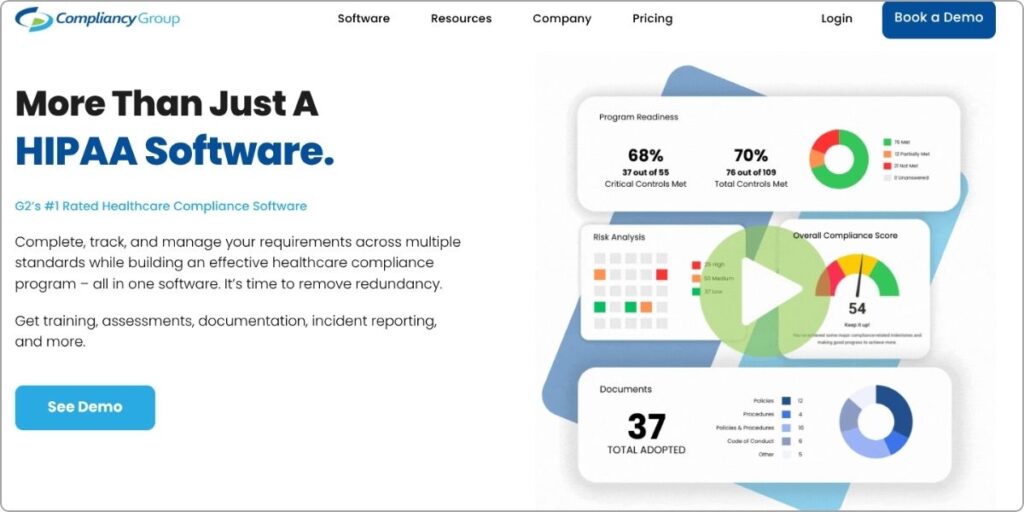
Founded in 2015, Compliancy Group makes HIPAA straightforward for healthcare practitioners, implementing a HIPAA Cloud Compliance solution in simple plans with clear instructions. It is easy to use because it guides the user through processes that are compliance related, which makes it ideal for SME practices. This saves the user from the hassle of trying to understand and work through several legal rules since the program already does all this for the user.
Such help guarantees clients can practice necessary precautions as well as meet entire requirements for audits. The availability of features such as integration allows the platform to be a useful tool when businesses wish to integrate their compliance plans. Compliancy Group stands out as an effective Healthcare Compliance Software solution for healthcare practices.
Features:
- Automated HIPAA Risk Assessments: Synthesizes procedures that help to identify the existent weaknesses more efficiently.
- Policy and Procedure Templates: Offers the pre-cooked form that can help in fast documentation.
- Dedicated Compliance Coaches: Provides live support to assist in any compliance issue for customers.
Pros:
- Easy-to-use interface
- Comprehensive live support
- Simplifies audits
Cons:
- Limited integration with third-party tools
- Best suited for small organizations
- Pricing can be high for larger practices
Price: Starting at $99/month
Website: www.compliancygroup.com
2. MedTrainer
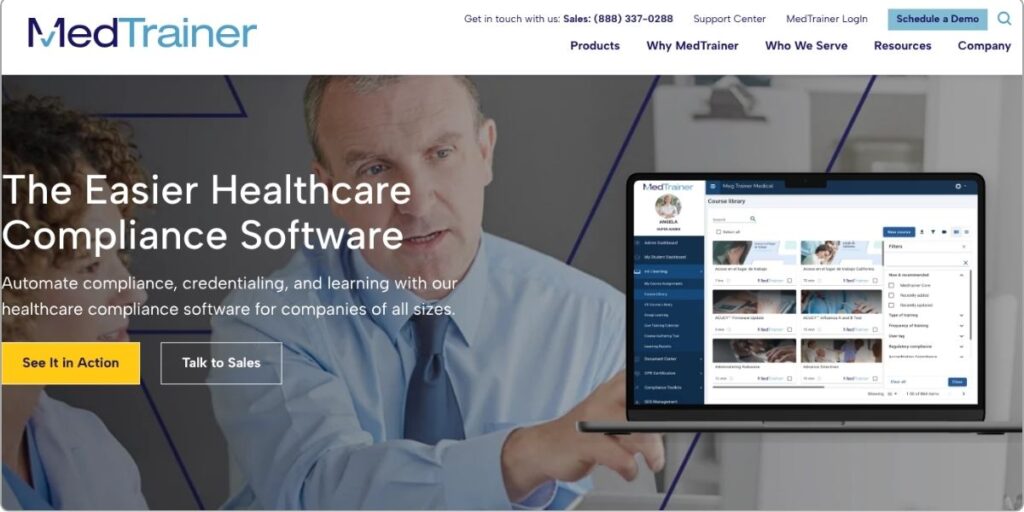
MedTrainer is a comprehensive and multifunctional compliance solution with LMS, credentialing and incident tracking capabilities. It is intended to reduce the reporting burden of institutions conducting compliance Training whilst offering tailor made Training modules for employees in the health sector. Some of the benefits that arise from the use of this makes it suitable for clinics and large institutions.
The document management and the audit readiness options maintain crucial compliance documents and papers easily accessible. Because of this feature that allows MedTrainer to grow along with the size of the organization, As a reliable Healthcare Compliance Software, MedTrainer secure seamless compliance management at every step.
Features:
- Learning Management System (LMS): It is mentioned that various training modules can be developed / tailored for different employees into the healthcare industry.
- Credentialing Management: Organization of credentials for both staff and or/and vendors.
- Incident Reporting: Reduces formality of recording workplace occurrences Provides clearer distinction between workplace accidents and other occurrences.
Pros:
- Comprehensive all-in-one solution
- Easy integration with HR systems
- Scalable for various organization sizes
Cons:
- May require training to navigate fully
- Expensive for smaller clinics
- Limited customization for training modules
Price: Starting at $150/month
Website: www.medtrainer.com
3. Symplr Compliance
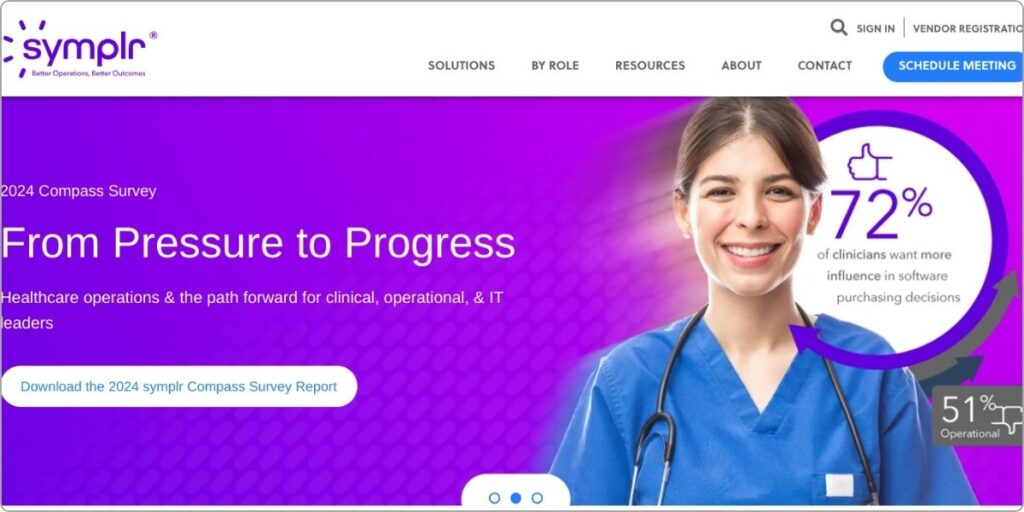
Symplr Compliance can be best suited for large-scale healthcare systems that require sophisticated compliance instruments. Its strong framework for policy governance, workforce management, and audit support is easily why in hospital networks and multiple facilities.
The analytic features of the software generate insights which enables organisations to notice risks and reduce them. Indeed, when it comes to scalability and reports generation tools, the solution demonstrates top results; however, being rather complex and rather expensive, it may not fit mid-sized or, especially, small providers. Healthcare Compliance Software like Symplr Compliance stands out for its robust capabilities.
Features:
- Workforce Compliance Tracking: Nasim also supervises compliance with regulation by the employees.
- Policy Management: Enables the development and communication of framework to disseminate policies.
- Advanced Data Analytics: Provides detailed recommendations to increase the probability of no adverse events and to make better decisions.
Pros:
- Tailored for large organizations
- Robust reporting capabilities
- Strong focus on risk mitigation
Cons:
- Expensive for small to mid-sized providers
- Steep learning curve
- Requires dedicated IT resources
Price: Custom pricing based on organization size
Website: www.symplr.com
4. Policy Manager

HealthStream’s Policy Manager is a cloud-based solution developed for organizations to manage their critical documents with the highest efficiency. It provides an online, centralized, fully searchable repository of policies with facets of auto-distribution, tracking, attestation, and streamlined workflow for review, revision, and approval.
It offers employees easy access to the latest policies while it enables organizations to track acknowledgment and comprehension in staff.
With more than 300 customizable policy and procedure templates based on specific roles, HealthStream works with industry experts to tailor its templates in accordance with the Joint Commission to support accreditation and compliance.
Features:
- Automating Workflows: Seamlessly distribute, track, attest to, and approve with in-process automation.
- Centralized access to policies-employees are assured of the latest policies always and in one place.
- Employee Compliance Tracking: Track employee acknowledgment and understanding easily.
- Huge Template Library: Tap into over 300 professionally designed and industry expert-built templates.
- Joint Commission Integration: Align policies with accreditation requirements through seamless integration.
- Role-based personalization: Tailor templates for specific roles for better compliance and efficiency.
Pros:
- Cloud-Based Accessibility
- Extensive Template Library
- Employee Tracking Features
Cons:
- Cost Considerations
- Dependency on Internet Access
- Limited Offline Functionality
- Template Overload
Price: Contact for Price
Website: www.healthstream.com/solution/quality-compliance/policy-management/policy-manager
5. iContracts Universal Compliance
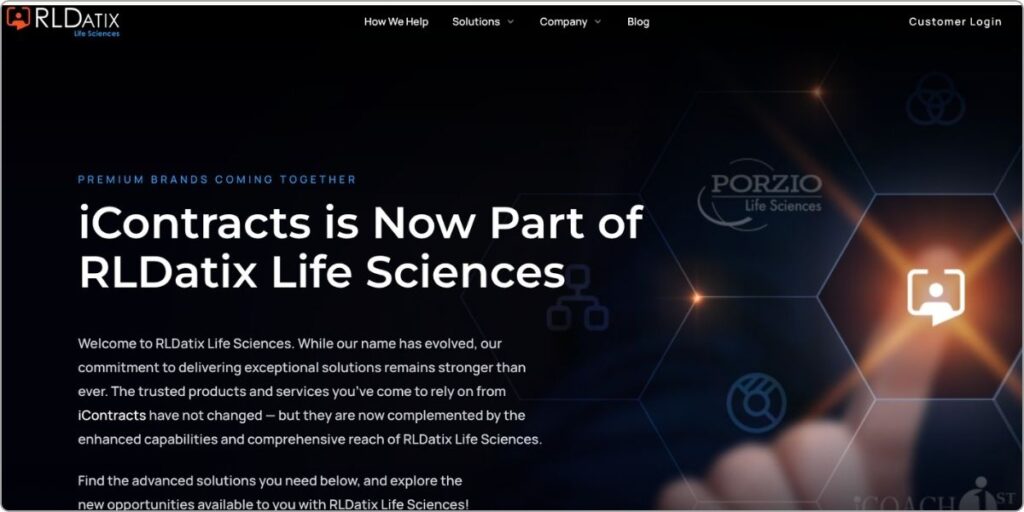
iContracts provides a single place to organize the overall compliance with the healthcare regulations. Its cloud-based solution helps the organization to manage contract, policy, training, and audit support functions effectively. This renders it a very useful tool to any care furnish that has to operate within a dynamically changing lawful system. Making it a strong choice for Healthcare Compliance Software.
Some of these tools include automated scheduling which eliminates different working on papers and faxing thus freeing a lot of time for the treatment of patients. Nevertheless, the apps’ lack of great flexibility and some difficulties when it comes to their easy usage may become an issue for people who are looking for customized apps.
Features:
- Contract Management: Reduces confusion related to documents and contracts to a single source of management.
- Policy Management: Has tracking and monitoring and updating of policies in one network.
- Training and Audit Readiness: Helps organizations to prepare for compliance audit.
Pros:
- Strong contract management tools
- Centralized compliance system
- Good customer support
Cons:
- Limited industry-specific features
- Moderate learning curve
- Customization options can be limited
Price: Custom pricing available
Website: www.icontracts.com
6. HIPAA One
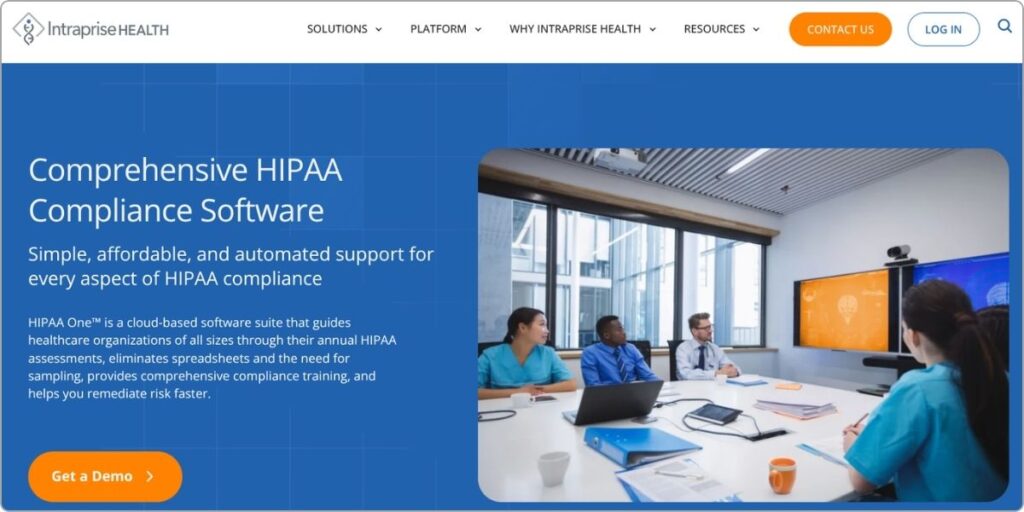
HIPAA One is the compliance software that is tailored and dedicated entirely to HIPAA compliance, its emphasis is risk management and analysis of gaps. For healthcare providers, its automation features are useful in determining various risks and fashioning ways to meet HIPAA guidelines more effectively.
Easy to use; offers document tracking and reporting which…makes compliance auditing meaningful. While its focus is heavily on the HIPAA compliance it covers all the aspects which are required under this act, As a Healthcare Compliance Software, it may lack other requirements of other regulatory bodies.
Features:
- Automated HIPAA Risk Assessments: Looks at the areas which the company has failed to meet the set laws and regulations.
- Security Gap Analysis: Reveals risks inherent in the structure of an organization.
- Document Tracking and Reporting: Carries full audit trails.
Pros:
- User-friendly interface
- Comprehensive HIPAA focus
- Time-saving automation tools
Cons:
- Limited to HIPAA compliance
- High initial setup cost
- Not ideal for larger organizations
Price: Starting at $49/month
Website: www.hipaaone.com
7. Verisys Compliance
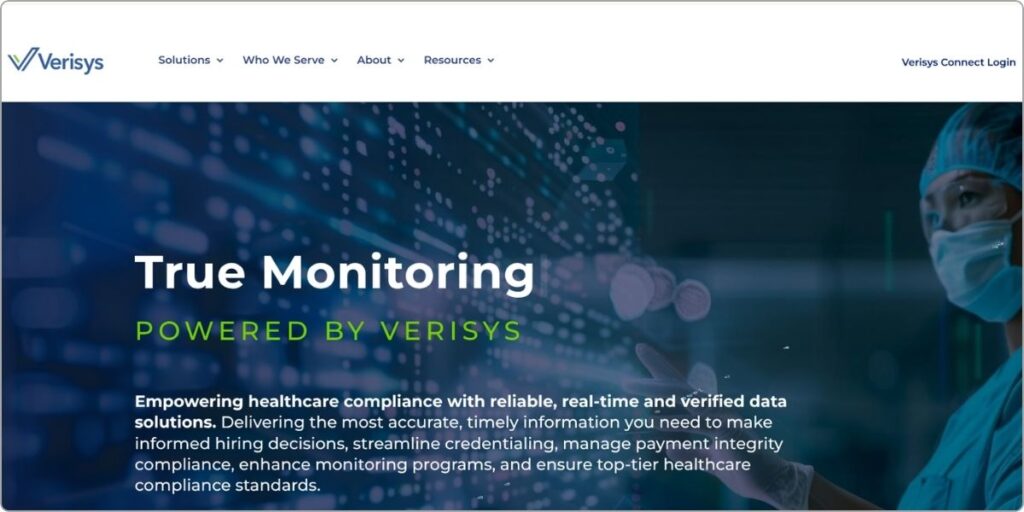
Through Verisys Compliance, organizations get tools in credentialing, oversight and exclusion to reduce risks affecting healthcare sectors. Its real time monitoring affords compliance with new set regulations, its credentialing feature authenticates employees as well as vendors.
Verisys may be highly effective as a risk management tool but it requires a higher training level and it is more expensive than its competitor for small organizations. Due to the concentration on decreasing legal and operational risks, the Healthcare Compliance Software can be useful to medium to large providers.
Features:
- Credentialing and Verification: In addition, it guarantees compliance of the employees and the vendors with the set regulations.
- Exclusion Monitoring: Is able to identify and minimise risks arising from those who have been excluded.
- Compliance Dashboards: Provides timeliness on compliance-related undertakings.
Pros:
- Excellent credentialing features
- Real-time monitoring capabilities
- Effective risk reduction tools
Cons:
- Higher cost for smaller providers
- Limited policy management features
- Steeper learning curve for new users
Price: Custom pricing
Website: www.verisys.com
8. HealthStream Compliance Manager
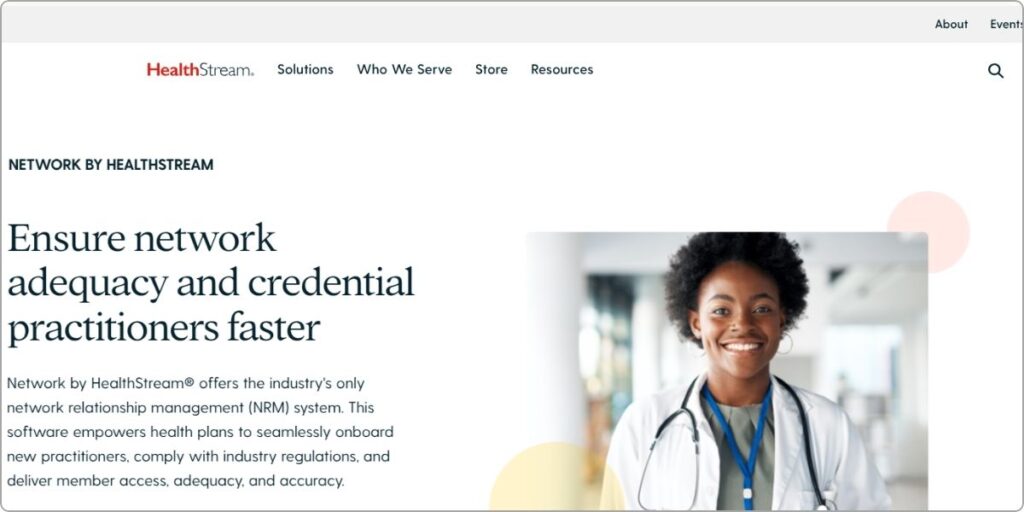
HealthStream is specialized in the healthcare workforce development and compliance training. Its e-learning modules and LMS makes it possible to continuously train employees to meet recommended government regulations.
On this basis, the Healthcare Compliance Software, is scalable enough to support organisations of any size. However, it has a disadvantage of lower level of analytics in comparison, for instance, with some other tools, and the disadvantage of the infrequent updates of the training materials.
Features:
- Interactive Compliance Training: Implements e-learning modules to capture the attention of employees.
- Learning Management System: Integration centralizes the responsibility of training.
- Policy and Procedure Oversight: Controls documentations to meet the relevant legal requirements.
Pros:
- Engaging training modules
- Seamless LMS integration
- Scalable for organizations of all sizes
Cons:
- Training module updates may lag
- Limited analytics functionality
- Costly for smaller facilities
Price: Starting at $200/month
Website: www.healthstream.com
9. Datix Compliance Management

RLDatix integrated Healthcare Compliance Software, risk and incident tracking and covers organizations of different sizes in the healthcare industry. It has provided its site with powerful tools to manage policies and procedures that facilitate compliance oversight as well as make compliance easy to use.
Its outstanding feature of the platform is the ability to outline risk levels and offer solutions to healthcare providers. However, its pricing and capability to integrate with other software solutions that is quite limited makes it even a daunting proposition for the smaller practices.
Features:
- Incident management: registers and handles compliance matters that are related to violations.
- Risk mitigation tools: that respond to organizational risks.
- Policy and procedure: management cleaner record, easier to document and update on an ad-hoc basis.
Pros:
- Strong incident management system
- Excellent risk analysis features
- User-friendly interface
Cons:
- Pricing can be prohibitive
- Limited integration options
- Requires training for full utilization
Price: Custom pricing available
Website: www.rldatix.com
10. NAVEX Global
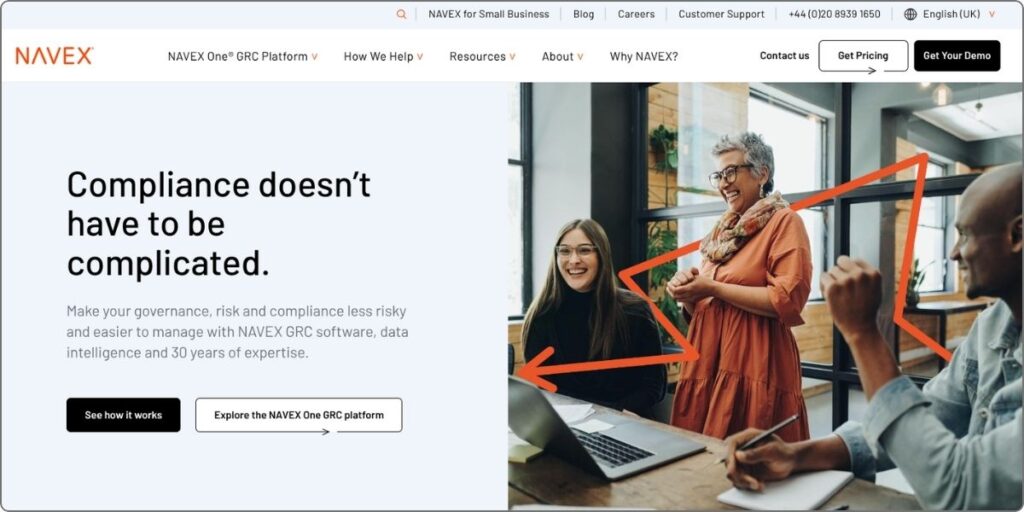
On the idea of Healthcare, NAVEX Global offers a complete solution for the compliance and issues risks of the industry. Automated workflow, policy management and real time regulatory alert assure compliance with regulations is always on.
The Healthcare Compliance Software is very flexible and since it is really large scale, it can actually accommodate larger corporations. However, it seems to be slower than others, costlier, and may not be so suitable for small or medium sized providers.
Features:
- Reduces the burdens of compliance work and activities.
- Gives current information on modifications of laws and regulations.
- Facilitates and leads the management and retention of important compliance reports.
Pros:
- Broad compliance management tools
- Scalable for large organizations
- Real-time alerts for regulation changes
Cons:
- Steep learning curve
- Expensive for smaller practices
- Complex setup process
Price: Starting at $150/month
Website: www.navex.com
How to Choose the Best Healthcare Compliance Software
- Regulatory Compliance: It maintains compliance with HIPAA, GDPR and other standards.
- Time Savings: Assists in the automation of manual compliance jobs therefore easing the burden.
- Error Reduction: Reduces probability of having human errors because the system operates on its own.
- Data Security: Helps to prevent leakage of patient information.
- Scalability: Complements the requirements of establishing growing healthcare organizations.
- Cost-Effectiveness: Keeps the firm out of trouble, thus avoiding costly penalty and compliance charges.
Conclusion
So these are our top Healthcare compliance software. These solutions make risk disappear, help reduce time spent on compliance tasks, secure data, and sustain trust from patients as well as other stakeholders. Out of the vast number of solutions, selecting the one that will serve your company’s requirements best can be a defining move toward compliance success. Some of the additional filters that should be set when making the choice, for example, audit readiness or the possibilities of the program’s expansion, training modules, etc.
The ten solutions we looked at have special features that fit different organization needs, from small clinics to big healthcare systems. Some tools like Compliancy Group and NetCompliance are good for smaller practices because they’re cheap and easy to use. Other platforms like Symplr Compliance and NAVEX Global can handle the complex needs of larger organizations. Picking the right software depends on things like how big your organization is, how much money you can spend, and what specific compliance needs you have.
FAQs about Healthcare Compliance Software
What is the main function of HIPAA compliance Tool?
It also provides for following legal, ethical and regulatory requirements in healthcare organization through various compliance-related issue identification and solution automation.
Is it important for small clinics to start using healthcare compliance software?
Of course, even small clinics today have to follow rules such as HIPAA and compliance software makes them handle these effectively.
Does the utilisation of the Healthcare policy management system enhance HIPAA compliance?
Even with HIPAA compliance, the organizations require organizational policies that meet the standards and training of their employees.
Internally, is it possible for healthcare compliance software to link with others?
An added advantage is that most solutions have integration compatibility with HR, EHR, and other management systems.
At what frequency should compliance software be updated?
This is in view of one of the specifics that called for regular updates as a result of changes in regulation and enhancement of the software.
